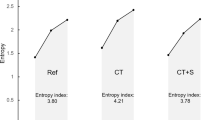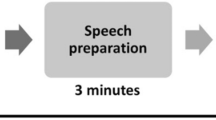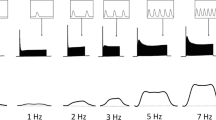Abstract
PSYCHOLOGICAL stimulation affects the normal cardiac function in man, causing tachycardia and vascular spasms; if these continue for a sufficiently long time, they may become, according to some workers, very important factors in the pathogenesis of some cardiovascular diseases1. We have studied the effect of repeated stimulation on the hearts of laboratory animals.
This is a preview of subscription content, access via your institution
Access options
Subscribe to this journal
Receive 51 print issues and online access
$199.00 per year
only $3.90 per issue
Buy this article
- Purchase on Springer Link
- Instant access to full article PDF
Prices may be subject to local taxes which are calculated during checkout
Similar content being viewed by others
References
Woodworth, R. S., “Psychologie Expérimentale” (French ed. Presses Universitaires de France, Paris, 1949). Altschule, M. D., Circulation, 3, 444 (1951). Raab, W., Cardiologia, 22, 291 (1953).
Hawk, P. B., et al., “Practical Physiological Chemistry” (Blakiston, Philadelphia, 1949).
Kahan, J., Arch. Biochem. Biophys., 47, 408 (1953).
La Page, G. A., “Manometric Methods and Tissue Metabolism” (Burgess, Minneapolis, 1949).
Mascitelli-Coriandoli, E., and Boldrini, R., Nature, 179, 1196 (1957).
Author information
Authors and Affiliations
Rights and permissions
About this article
Cite this article
MASCITELLI-CORIANDOLI, E., BOLDRINI, R. & CITTERIO, C. Cardiac Damage caused by Experimental Stress. Nature 181, 1215–1216 (1958). https://doi.org/10.1038/1811215a0
Issue Date:
DOI: https://doi.org/10.1038/1811215a0
Comments
By submitting a comment you agree to abide by our Terms and Community Guidelines. If you find something abusive or that does not comply with our terms or guidelines please flag it as inappropriate.



